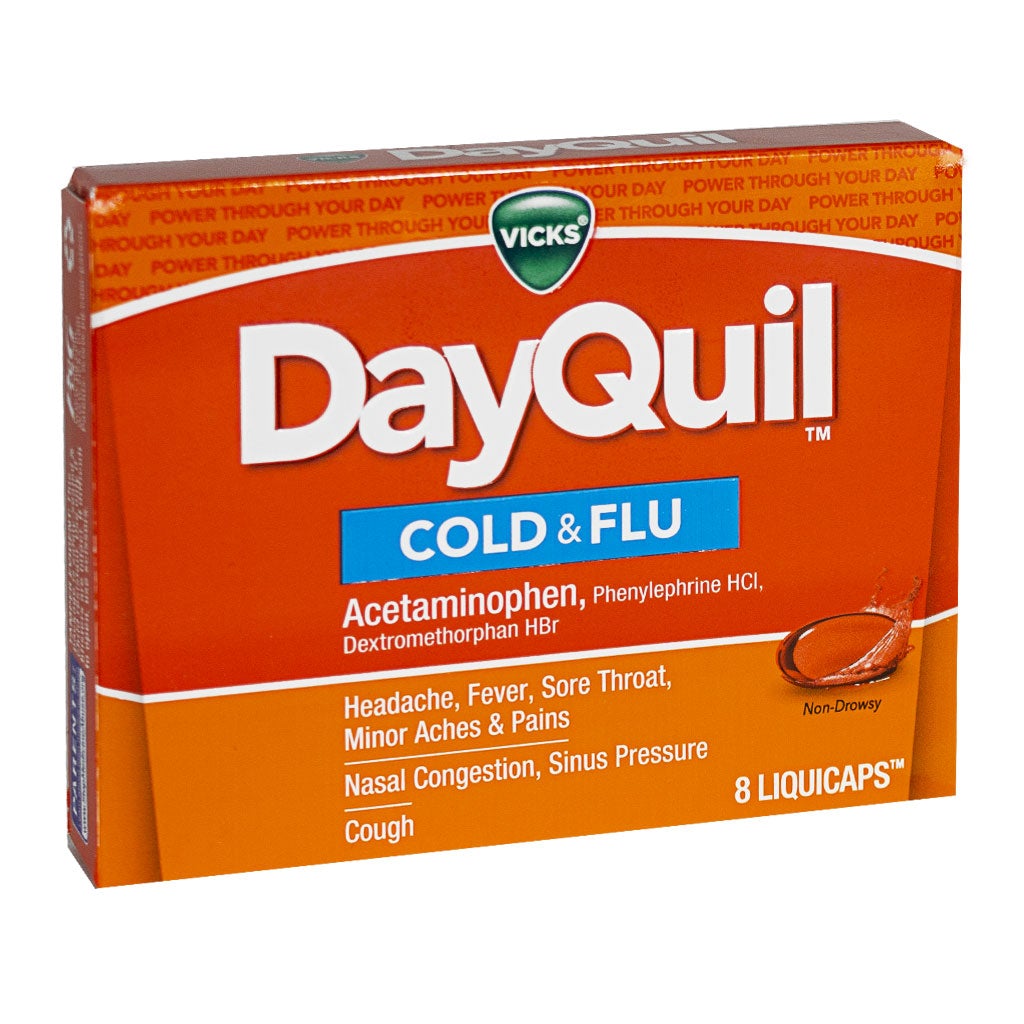What is DayQuil?
DayQuil is a brand name cold medicine that has both daytime and nighttime formulas. It doesn't contain any alcohol, unlike Nyquil.
What does it do?
Like other OTC medications: DayQuil contains decongestants and antihistamines (the ingredients in Sudafed and Benadryl) to make you feel less stuffy and alleviate some of your symptoms of the common cold. Because the medication is not regulated by the FDA, all dosage information must be found on the package.
If you're taking prescription-strength doses of these medications, consult your doctor before taking this or any other OTC medication. Donating plasma may also be an alternative for those taking high levels of antihistamines.
What is inside DayQuil?
DayQuil has acetaminophen, dextromethorphan, phenylephrine, and doxylamine succinate.
Acetaminophen - This painkiller is known for its fever-reducing qualities. However, it may hinder the body's ability to retain folate (a B vitamin) which can lead to several birth defects even in small doses.
It also increases the risk of liver toxicity when taken at high doses over time. For this reason, pregnant women are advised not only to avoid drinking alcohol but also to take no more than 1 gram of acetaminophen per day. Acetaminophen is also found in many other OTC medications including Tylenol, Nyquil, and DayQuil.
Phenylephrine - Like other cold medications, this is a decongestant that decreases swelling in the nasal passages. It also increases blood pressure which may lead to adverse effects when taken with other stimulants.
Dextromethorphan - A synthetic opioid-like drug, this suppresses coughing by working on the areas of the brain that control it.
Doxylamine succinate - Like antihistamines, doxylamine is used to reduce symptoms of allergies and congestion.
So, who should take these pills?
According to the American College of Obstetricians & Gynecologists, pregnant women should only take cold medicine if recommended by their doctor. There are risks and benefits to taking any medication during pregnancy, so be sure to speak to your doctor before you do.
Nursing moms should also talk with their doctors first before taking DayQuil or other OTC medications. The benefits of feeling better may outweigh the risks of these medications for some people. However, breastfeeding mothers should consult with their doctors about how much decongestant is safe to take while nursing - decongestants can lead to an increase in heart rate in babies.
To play it super safe, ask your OB-GYN if they think it's okay to take this medication while nursing. If their answer is no, you can take something else that's commonly recommended during pregnancy and breastfeeding like Tylenol.

Keep in mind that some moms may want to avoid taking OTC medications because these drugs are known to get into breastmilk.
If your doctor thinks it's okay for you to take this stuff, be sure not to exceed the dosage directions on the package. It also wouldn't hurt to pump and dump for a few hours after taking this or any other medication, just in case. You can always save the milk for later - you don't want it going bad!
How does DayQuil affect your baby?
DayQuil contains a decongestant and antihistamines, both of which can have some undesired effects on your baby if you take them while nursing.
According to Dr. Sears, Decongestants thin the mucus that helps protect the lining of the nose. In small doses, these drugs may not be harmful to either you or your baby, but always play it safe with cold medicine - talk to your doctor first before taking this stuff!
Antihistamines also thin mucus and widen blood vessels. It's important for a mom to know that when her baby drinks this thinned out milk, their blood vessels will widen as well. Theoretically, this could cause low sugar in babies since they would have to work harder for their bodies to absorb all the sugars in breastmilk. However, this side effect is rarer than the others.
How long should you wait before nursing again?
Just follow the dosage instructions on the package of DayQuil! The general recommended time for how long to wait after taking this medication before nursing again is 4 hours. After that, you're free to nurse your little one!
Why should you be careful?
Taking high levels of antihistamines can lead to your baby being drowsy or unable to eat because of decreased milk supply. Your pediatrician may switch you over to a different medication if this occurs. It's also best not to take DayQuil near bedtime due to the side effects, including agitation and hallucinations, which may keep both mother and baby awake at night.
When should you NOT take DayQuil?
If your child is younger than 2 years old, talk with your doctor before taking any medicine for a cold, especially an antihistamine because it could affect their nervous system. That said, there are many other medications available that are safe for nursing moms to take and help with cold symptoms. Older children can safely take DayQuil unless they have a chronic health condition such as heart disease, hypertension, glaucoma, or hyperthyroidism, which may make the medication dangerous.
Your doctor will likely recommend an OTC decongestant like Sudafed (called Pseudophed in Canada) to keep your nose clear and alleviate your sinus pain. These products typically come in liquid and tablet forms. I've read that it's safe to use these medications for up to three days; if you're still congested after that time frame, then you should contact your doctor because you could be dealing with a sinus infection.
If you're really sick and you've tried all of this without success, then take one or two hours off of nursing to sleep it off. An infant will nurse the majority of the time they're awake for approximately four months, so if you can get some rest while he sleeps, your body will have a chance to heal itself more quickly. This is not an easy task, but remember that you'll feel much better after getting some sleep!

Can you take DayQuil if you are pregnant?
Yes, you can take these medications if you are pregnant. According to Dr. Sears, "Taking OTC cold medicine during pregnancy is safe, but check with your doctor first."
Just be sure that DayQuil does not have any other active ingredients that may be dangerous to your baby. Always read the list of ingredients on medicine before taking it while pregnant just to be on the safe side!
What does the research say?
The U.S. Food & Drug Administration classifies DayQuil as a category C pregnancy drug. This means there haven't been enough studies done on how it affects developing babies in utero - some animal studies indicate potential harm, but no human studies or case reports have shown any adverse effects on the fetus when used during pregnancy.
So... maybe don't take it without consulting with your OB-GYN first? But there's not much evidence out there about what happens when you take these drugs while nursing, either. A 2005 study stated that because of the limited knowledge about how these medications affect infants, they should only be used as a last resort.
Are there any alternatives to DayQuil?
If you'd like to use an alternative medication for your sinus pain, ask your doctor about using a nasal spray containing xylometazoline. According to the American Academy of Pediatrics, this type of decongestant is safe for infants older than 2 months because it does not enter breastmilk in any significant amount.
What about taking Nyquil?
Nyquil contains alcohol and should be avoided at all costs while breastfeeding. If taken near bedtime, it could disrupt your baby's sleep patterns. The side effects associated with Nyquil are similar to DayQuil; however, we would recommend against taking it because Nyquil contains 25% more of the active ingredient (in this case, dextromethorphan) than DayQuil; therefore, it's much easier to overmedicate.
What are the side effects of DayQuil?
DayQuil can cause severe drowsiness, so it's best not to take it while nursing. Side effects of pseudoephedrine include:
- Nervousness and excitability (in children)
- Agitation and irritability (in adults)
- Insomnia (in adults)
- High blood pressure (in hypertensive patients)
If the DayQuil doesn't clear up your baby's cold symptoms or if you feel like he is having any negative side effects from taking this medication, contact your pediatrician immediately.
What are the contraindications for taking DayQuil?
DayQuil should not be taken by any breastfeeding mothers who are taking monoamine oxidase inhibitors (MAOI's) such as furazolidone, isocarboxazid, phenelzine, selegiline, or tranylcypromine. It's also a good idea to check with your doctor before taking DayQuil if you have high blood pressure, heart problems/ rhythm disturbances, thyroid disease, glaucoma, prostate enlargement or over-active thyroid.

What other pills may have an influence on breastfeeding moms?
NSAIDs (ibuprofen) and Acetaminophen are known to affect milk supply. A baby's liver processes these medicine very differently than an adult, so it's best to avoid taking them while nursing. These drugs can be used if there is no other option available.
The following drugs should also be avoided:
- Barbiturates (includes phenobarbital)
- Benzodiazepines (includes diazepam and lorazepam)
- Opioids (narcotic pain relievers like oxycodone and hydrocodone)
- Steroids (medications containing corticosteroids like Prednisone or Dexamethasone)
What products you shouldn`t eat while breastfeeding?
Don't eat anything that would be potentially harmful to your baby. For example, some seafood may contain mercury which is especially dangerous for developing brains and livers. Not only could it damage the baby's organs, but you can pass those toxins on to him through your milk.
Also, avoid unpasteurized dairy products, anything high in caffeine (green tea, coffee), and any product that might have wheat or gluten in it.
The most important thing to remember is always talking to your doctor about the medications you're taking. While some drugs are not recommended for breastfeeding moms, most modern medicines do not appear to be harmful to your baby when taken occasionally.
Just use common sense and discretion when making decisions about what medicine is right for you. Do you think there is something we missed? Let us know in the comment section! If this article helped you please like it with sharing buttons below!
Conclusion
From what we have gathered, it seems safe to take DayQuil with pseudoephedrine while nursing. However, the side effects of the medication are so severe that your baby`s health is better without it. We don't recommend taking any medicine during lactation unless it's absolutely necessary for mom's well-being.
As you can see from this research there are many risks associated with taking the most common medicines while breastfeeding, especially with newborn babies. We hope you find our article helpful and please feel free to check out our other articles about breastfeeding! Best wishes!